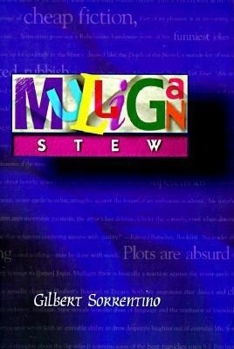Mulligan Stew
Select Format
Select Condition 
Book Overview
Widely regarded as Sorrentino's finest achievement, ?Mulligan Stew?takes as its subject the comic possibilities of the modern literary imagination. As avant-garde novelist Antony Lamont struggles to write a new wave murder mystery, his frustrating emotional and sexual life wreaks havoc on his work-in-progress. As a result, his narrative (the very book we are reading) turns into a literary stew an uproariously funny melange of journal entries, erotic...
Format:Paperback
Language:English
ISBN:1564780872
ISBN13:9781564780874
Release Date:January 1996
Publisher:Dalkey Archive Press
Length:446 Pages
Weight:1.58 lbs.
Dimensions:1.4" x 6.1" x 9.2"
Grade Range:Postsecondary and higher
Related Subjects
Contemporary Education & Reference Fiction Humor Humor & Entertainment Literature & FictionCustomer Reviews
5 ratings
Everything Literature, and Then Some
Published by Thriftbooks.com User , 14 years ago
Fans of Gilbert Sorrentino are in for a treat (think cupcakes) when they feast their eyes on Mulligan Stew. The talented author seems to pour his entire talent into this concoction of fictional delight. Or is it fiction? Can writer Antony Lamont, sometimes narrator, a character of declining fortune in words and love and friends, be Sorrentino disguised? Regardless of whether there is a touch of the autobiographical, Mulligan Stew has something for everyone. But do not expect that all will be resolved and tied into the typical resolution of the novel, that the path Sorrentino begins wends its way to a tidy conclusion. No, "dear, gentle friend" (359), between chapter 1 and the nonsensical dialogue that is the final ingredient of the stew our dear author throws in an entire repertoire of fictional devises. He mixes them up and throws them on the page for the reader to glean every delicious morsel of the making of fiction. Mulligan Stew is at times absurd, its characters take on dual existence, both in the novel and in lives of their own. Ned, Martin, and Lamont, each unravel in various ways, fictional Lamont's decline mirroring that of his fictional protagonists. Paralysis affects them both. Martin seems stuck in the cabin forever and Lamont is seemingly stuck writing of Martin and Ned forever. Sorrentino employs an epistolary form throughout this metafictional work, beginning with a parade of letters from publishers rejecting his work. His letters reveal relationships and emotional states of the characters, mainly those of Lamont, the frustrated writer. Where letters expose the agitated state of the Lamont, our true author sprinkles different styles throughout. Juxtaposed against the darkness of Ned's predicament, Sorrentino inserts humor and throws in erotica to suit a different audience. His use of varied syntax, clichés, and metaphors are mixed in with varied vernacular, poetry, and endless lists. He borrows characters and words from past authors and poets (Fitzgerald and Frost, for example). For the visual art lover, the background for the scene in Chapter 8, beginning on page 226, is reminiscent of Hopper's "Nighthawks." The work is a veritable handbook of how to and not to for the aspiring writer. Between the storms, the blue sky, and the jigsaw puzzle pieces, Sorrentino drops hints of the elements of the novel: pay attention to the tense, take care with your inventory, do not use those worn out tired old phrases, and remember where you leave your characters. Sorrentino seems to pull in all he knows of life and love and writing and drops the coagulation of these experiences in the form of words on each page. This is a must read for the creative writer and clever reader who appreciates the bounty of words in our language laid out in every conceivable manner. There is no end to the mystery that Sorrentino has stirred up for his audience, and no end to the discovery of delectable tidbits of writing wisdom found on each pag
Really funny, really absorbing
Published by Thriftbooks.com User , 14 years ago
The funniest two bits in the book are 1) the parody of erotic fiction ('Nameless Shamelessness,' I think) and 2) the gag where Sorrentino parodies cowboy fiction by giving the cowpokes heavy brogues. If you find the rest of the postmodern structure bogging you down, flip to one of those parts. But you probably won't be bored, because the novel flips back and forth between a writer's notebook, that writer's work, and the life that a few famous literary characters lead while not working. It's like what a Charlie Kaufman movie would be like if Charlie Kaufman could write good novels instead of mediocre movies.
funny, exuberant
Published by Thriftbooks.com User , 14 years ago
This is one of my favorite books. Goes beyond being a novel and is a hilarious read.
Re/A.J. Richardson's Review
Published by Thriftbooks.com User , 18 years ago
It's essential to note that anyone who codifies the "postmodern literary aesthetic" by complaining of its "woeful misuse" has written a priggishly self-impugning critique. I suspect that Sorrentino himself authored Richardson's review.
Sidesplitting skewering of bad writing & bad writers!
Published by Thriftbooks.com User , 26 years ago
A very funny, still timely look at the mind of a writer who is nowhere nearly as good as he hopes. He's a terrible writer, and is struggling desperately to avoid having to face it, but he's no better than the hacks and idiots he spews venom at. (The parody of erotic poetry alone is gaspingly funny and well worth the price of admission all by itself.) The book also touches on the old adage that a writer's only as good as his last book, and adds a sensible new dimension to it: that a book is only as good as its last writer. Not an easy read, and sometimes redundant, but still a scream.





